Why is it that despite the rise of powerful tools like solvers and GTO wizard AI, we have seen the average win rate of professionals slowly decline over the last few years? I will explain the answer to this question by showing you the five bad habits players develop when studying solvers and GTO strategies. By recognizing these habits, you can stop the decline, rise upwards, and make more money.
Bad Habit Number 1: Being Stuck in Defense
Players often fall into the trap of playing not to lose instead of playing to win. When we open a solver, we see a GTO strategy that provides a framework for unexploitable play by balancing optimally, making it unbeatable regardless of your opponent's strategy. Its goal is not to win the most money possible but rather to play a defensive strategy designed not to lose.
While not losing is a great place to start if you are a losing player, however, it is likely that your goal is to make the most money possible – which happens to not be the objective of the model you've been studying. In order to boost your winnings, you must evolve towards a more offensive strategy that takes advantage of the numerous opportunities available at the tables.
Bad Habit Number 2: Trying to Copy GTO Strategies Instead of Learning Poker Theory
As we concluded, GTO's goal is not to lose, while our focus should be on making the most money possible. This does not mean you should cancel your GTO Wizard subscriptions; rather, you need to shift your focus and adjust what you aim to learn from these solvers. When we stop trying to memorize and mimic the solver and instead look beyond frequencies and range constructions, we begin noticing recurring trends and patterns of play.
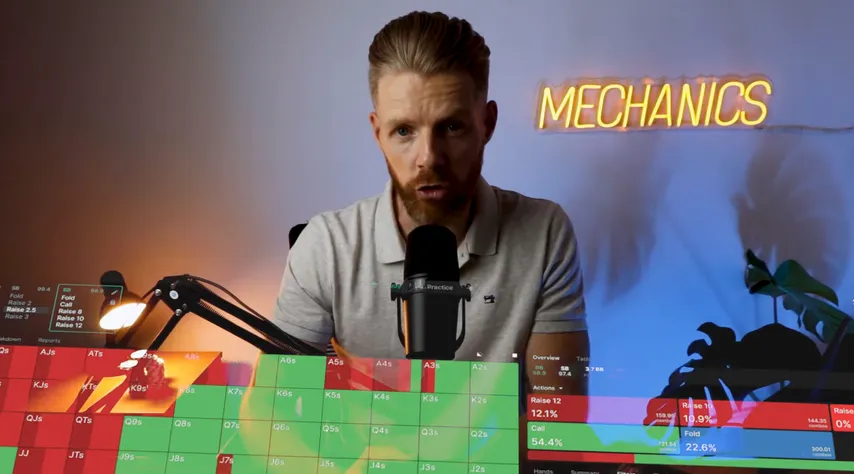
For example, we can identify circumstances in which we usually increase or decrease our bet sizing or frequency, what certain hand classes achieve in commonly used lines, and how they generate their expected value (EV). Understanding these drivers will help eliminate fundamental flaws in your approach to the game and enable better decision-making—even if you are a more exploitative player—because theory, unlike GTO strategies, offers more flexibility that allows you to adapt and maneuver in various situations.
Bad Habit Number 3: Thinking in "Have To" Instead of "Can I"
In Solverland, players have full information about their opponent's strategy. This means they must construct their ranges in a way that makes their opponent indifferent; for many hands in your range, there is no clear higher EV decision to be made. In other words, you're put in a tough spot because no action is clearly better than another. The solver must do this because its opponent is also playing perfectly; therefore, any imbalance in its strategy would have direct and expensive consequences.
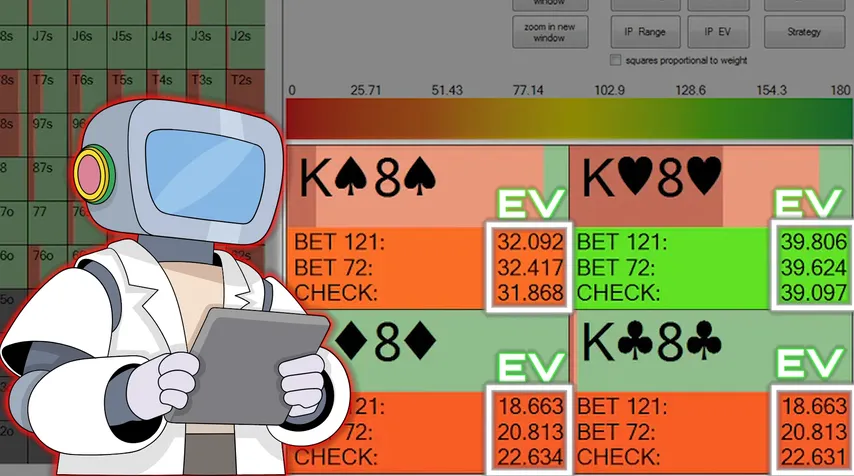
However, in the real world, those consequences don't exist as most players are too preoccupied with their own ranges and frequencies. They try to mimic solver strategies without focusing on yours. Even if they are aware of it, they won't execute the same counter-strategy as a solver would.
The truth is: you don't have to do anything. Instead, focus on what you can do based on the incentives given by your opponents and whether the play with be +EV.
When deciding whether to call or bluff on the river with a bluff catcher, for example, if you think you're going to have to call this hand a certain percentage of the time, you're implying that either your opponent is playing a perfectly balanced strategy or that you are able to execute a perfect GTO strategy which in both
cases, is very unlikely.
Don’t think about whether you have to call or bluff a certain percentage of the time for the sake of trying to be GTO. Instead, focus on whether you can make a +EV call or bluff in that specific spot. If considering a bluff, assess whether your opponent is likely to fold enough; if you're in a bluff-catching situation, evaluate whether this spot is sensitive to being over- or under-bluffed. These factors will truly impact your win rate.
Bad Habit Number 4: Thinking About Your Range and Frequencies Instead of Your Opponent's
Shifting from "have to" thinking to "can I" thinking is part of evolving from a defensive to an offensive mindset. We must stop thinking in terms of threats and instead look for opportunities presented by our opponents that allow us to make higher EV decisions. Instead of focusing solely on your own cards' range and tendencies, lift your head from the table and start observing those of your opponents.
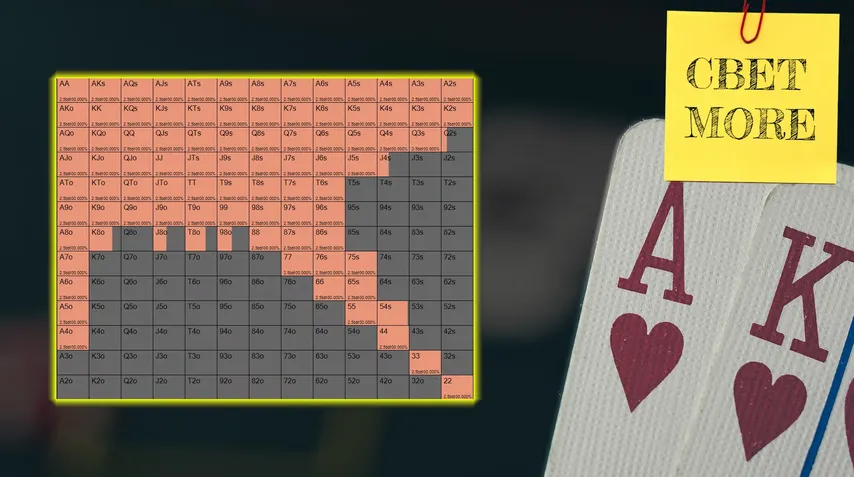
By recognizing these bad habits and adjusting your approach accordingly, you'll be better equipped to navigate the complexities of modern poker strategies while maximizing your potential for success at the tables.
You'll start to notice that most of the time, players are not employing a strategy so GTO that it makes your decisions indifferent. Instead, they have tendencies and give away information that incentivizes you to take one action more often than another. If we return to the key poker theoretical concepts that solvers can teach us, we find that equity and frequencies are the main drivers of strategy. Every human opponent has difficulty maintaining the exact frequencies and range constructions of a solver, and since their range construction determines your equity—and equity is the main driver of strategy—our primary objective should be to figure out what our opponent has and what they're up to. This information allows us to make higher EV decisions and deploy more effective strategies against them.
Bad Habit Number 5: Randomizing Your Way Through the Hand
If we look at a GTO flop c-bet strategy, we see the solver mixing a lot of hands. This mixing means that both lines are generating the same EV; it can't play its hand at a full frequency as this would either overshoot or undershoot the appropriate frequency for the situation at hand. It also cannot simplify by always betting one hand and never betting a similar hand in this category, as the villain knows their range, making their strategy predictable and exploitable.
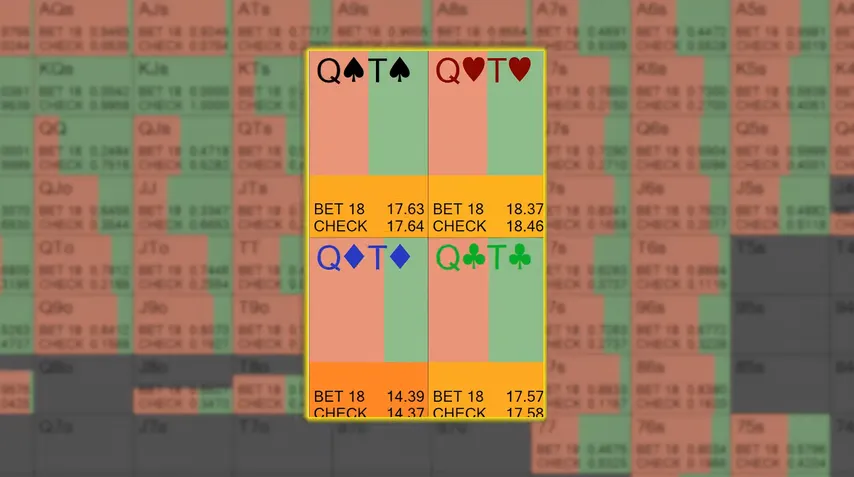
When we try to copy GTO strategies and start mixing combos simply because the solver does, many things can go wrong. The most significant error is not understanding how EV is generated in both lines taken. The actual EV of the hand—and therefore its indifference—is determined by how you execute and how your opponent responds in both lines. Whichever line you understand fully and can execute best—or in which you induce the most mistakes from your opponent—will be the highest EV line.
Bonus Bad Habit: The Blocker Fetish
When we are stuck in defensive poker, thinking "have to," and failing to plan ahead to figure out how to best generate EV, our decision-making process becomes chaotic. We start looking for any type of handhold to help us make decisions, with blockers being the most common handhold.
Since solver strategies are perfect, the only way we can influence our opponent's frequencies and gain the EV needed to make something plus EV is through card removal—aka blocking or unblocking call or folding ranges.
While it's true that blocking or unblocking increases or decreases the chances of something happening in most real-world situations, this alone is not enough to determine whether a play is plus or minus EV. Instead, it will only enhance or decrease the EV further.
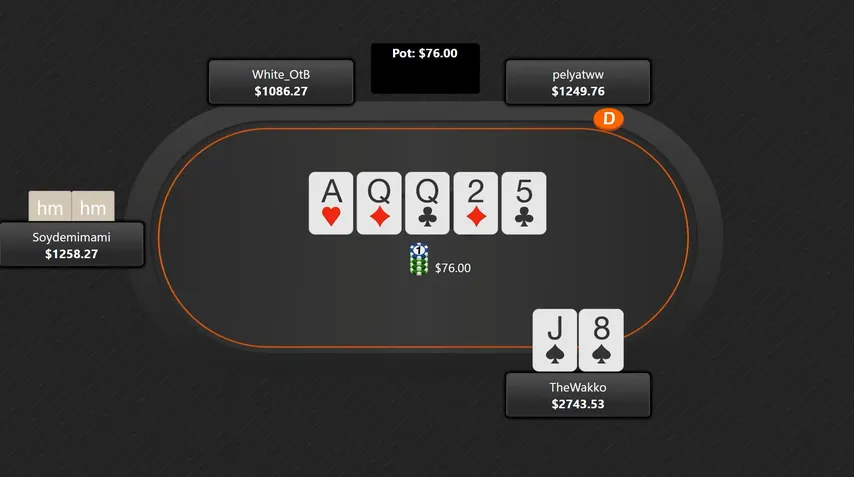
For example, if we are on the river deciding whether to bluff after having bet on the flop and turn (which went check-check), we see that the solver clearly prefers bluffs that do not block the folding range. While it’s true that this will decrease our bluff's success rate, it’s not particularly relevant because its impact on whether our bluff is plus EV is simply too small.
To prioritize blocking in our decision-making process seems pretty useless in reality; there are plenty of other variables that will have a greater impact on our play's EV than blocking or unblocking. However, since we've just spent 100 hours in solvers, this is where our minds tend to go when faced with decisions.
This steady decline in win rates among professionals over the last few years has me wondering: Are pros winning less because the field is becoming more GTO-oriented, or are they winning less because they're trying too hard to play GTO?















